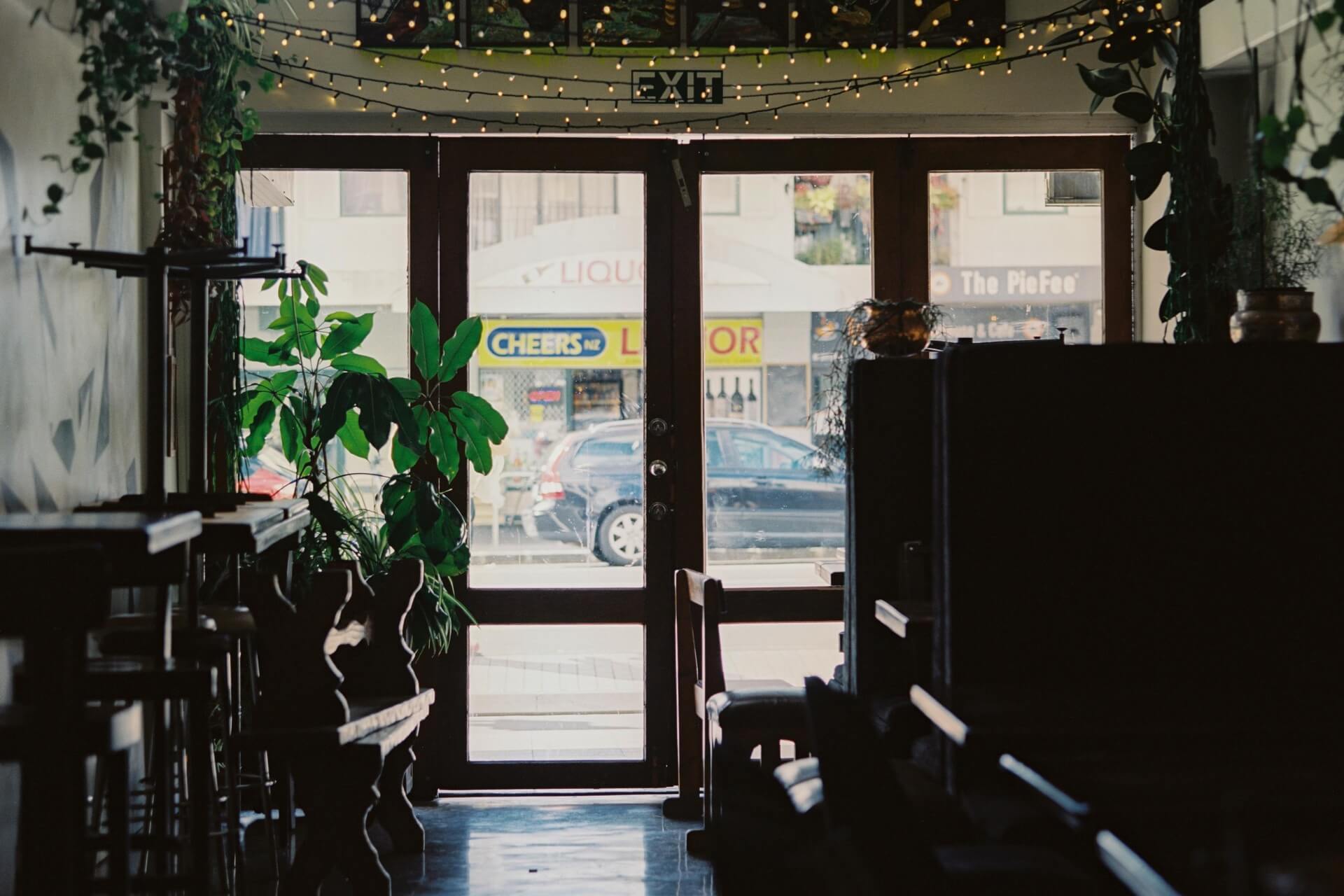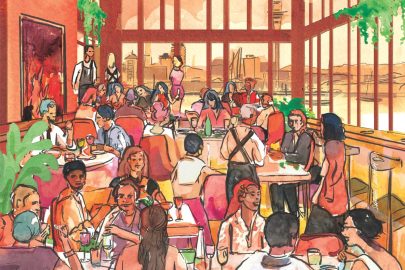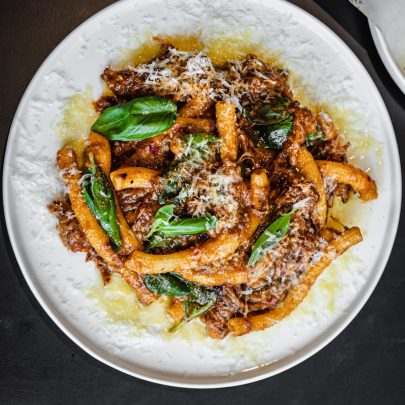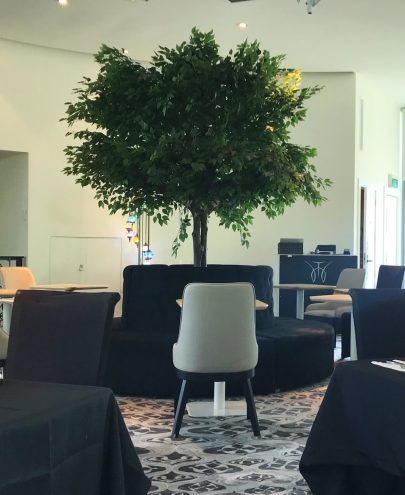Mar 1, 2023 Restaurants
There’s a lot of hunger in the hospitality world. The industry is attractive to many, but the faint-hearted do not last long. Hospitality stalwarts also engage in a game of musical chairs. You hear of people ‘doing the rounds’, zig-zagging through the city in search of their tribe. Restaurants, cafes and bars often have fleeting lives before fading away — and some sites seem to carry nine lives, playing host to numerous kitchens and incarnations in turn. There’s a charming, cyclical quality to the madness of the churn. And only a special few places leave a lasting impression.
From 2008 to 2013, the long cavern at 352 Karangahape Rd hosted the bar and dance club D.O.C (co-owned by Metro editor Henry Oliver). An icon of its time and adored by its community, D.O.C was deeply mourned after it closed its doors in 2013. When Lukrecya Craw took the site over to open Peach Pit , she knew she had big boots to fill. It was a gutsy move for an untrained 27-year-old chef with one hospitality job under her belt. But, like the authentic 90s kid she is, Craw has always lived by that famous Nike slogan: just do it. Nearly a decade on, and Peach Pit’s time is up. The site is ready to host new life, and another hospo dreamer.
Craw never intended for Peach Pit to become the unofficial arts bar for Tāmaki Makaurau. With the art world as the backdrop to her childhood, however, it’s no surprise that the scene showed up to the party. Peach Pit’s relationship with the arts flourished over the full course of its tenure; it was a home to artists and their art, on both sides of the bar. With an interior adorned with works by Jeena Shin, Andrew McLeod, Liz Maw, Sam Thomas and Glenn Otto, Peach Pit became the unofficial afterparty venue of the city’s gallery openings. The list of those working the bar is a veritable gallery stable in its own right, with a roster boasting Ayesha Green, John Ward Knox, Rea Burton and, for me, the most memorable of hosts, Owen Connors (a permanent fixture at the Pit for the better part of seven years), who led the service with generosity, intelligence and often a mesh vest, which it turns out does make everything taste better.
Peach Pit offers a space for art networking in the genuine sense: a place for creatives to meet their peers. (And, of course, to drink.) Artists don’t have offices or collective spaces to meet, they have bars. It’s a rarity to see a relation- ship between a business and its community so effortlessly symbiotic — a true circular economy.
I was 22 when Peach Pit opened, and I spent the first years of its young life smashing back my drink of choice in excess. Despite me not having ordered one for almost eight years, Craw still remembers my order — a mimosa, in a stemless vessel because I always split the coupe glasses. Over those initial years, I racked up a sizable, limitless bar tab. I am one of many to accrue a debt of this nature. On reflection, it seemed an insanely trusting position for an owner-operator to take toward an impulsive 23-year-old, but that’s Lukrecya Craw for you. In 2015, I visited Peach almost daily, and it was during this time I met the love of my life, Karl Bayly. He was, of course, an artist and one of the many bar stool regulars. We used to pash in the loos, the sparkly silver walls a theatrical backdrop to our messy young romance. Inthe middle of a quarter-life crisis and in desperate search of autonomy, I did what many choose to do and fled overseas. My parting gift to Peach Pit was to pay off my tab.
I lived abroad for three years, but I came home every summer and immediately found myself perched up at those coveted outdoor tables, talking trash before dashing to the kerb to obliterate yet another unnecessary cigarette. And when I finally moved back to Tāmaki Makaurau, Karl was right where I left him — parked up at the Peach Pit bar.
I don’t remember when I finally discovered the food at Peach Pit. As Craw found her feet, a few other chefs tried their hand at the food, but after two years of watching the way the space worked, she realised what was missing and took sole charge of the kitchen. It’s been that way ever since. It is impossible to categorise Craw’s food; it spans continents and palates, with cleverly treated vegetables in abundance, and always quietly caters to intolerances and dietary requirements. The dishes are fresh, playful and often have flavour curiosities I can’t identify. Most importantly, Craw’s food doesn’t compromise comfort and nourishment for imagination. It’s truly joyful.
Earlier this year, Karl and I venture out. We’ve had a rather large hiatus from the Pit (the pandemic, followed by pregnancy and a newborn), but we are ready for a nostalgic glimpse at our pre-infant selves and a satisfying meal. We know where to go. As we arrive at Peach Pit, worlds collide. It’s still the familiar setting of our past lives, but this time our baby daughter is in tow. It’s 5pm and we sit inside. There is another small baby on the table opposite. Karl heads up to the bar to joke with Lukrecya about her daycare-slash-diner. I spot the custom lamp (usually broken) that she commissioned Karl to make. Everything is the same; everything is different.
Giddy on the high of a rare outing, we order widely and select as much as we can from the specials board (which genuinely gets updated daily). The finer details of the meal escape me, but I recall an insanely generous portion of lamb rump, with a jus so delectable we pool the remnants on the edge of the plate and drink it with a spoon. There’s a side of greens — something we don’t usually bother to order when eating out, but we know Lukrecya will have treated them tenderly. A once dull plant suddenly becomes the hero of all vegetables. The dessert involves meringue and miso — the combination is majestic. Karl is besotted and notes down the flavours on his napkin. Everything we eat is phenomenal and nostalgic in a way we didn’t know we needed. Our souls and our bellies are nourished, and our bank balance unharmed. It was without a doubt, our most memorable meal of the year.
These days our lives are a little quieter, and we’re more about the food than the drink, but talk to anyone who has eaten at Peach Pit and you will hear the same thing. Lukrecya’s food is undoubtedly Tāmaki Makaurau’s best- kept culinary secret — it is baffling that it continues to go largely unacknowledged. Year after year, it remains largely absent from the city’s ‘best of’ lists, which I can only conclude is some categorisation issue. Perhaps the Pit’s fluid identity is too baffling to the judges. Is it a bar or is it a restaurant? If the food is good, does it matter? Despite missing the headlines, Peach Pit has always been completely unaffected by its lack of coverage, which is unquestionably a sign of its greatness. These days, most hospitality outfits operate with a distinct positioning, a tight public image and a strong internet presence. Lukrecya seems to skip all that and just do her thing, side-stepping the ‘prerequisites’ deemed essential for a successful venture.
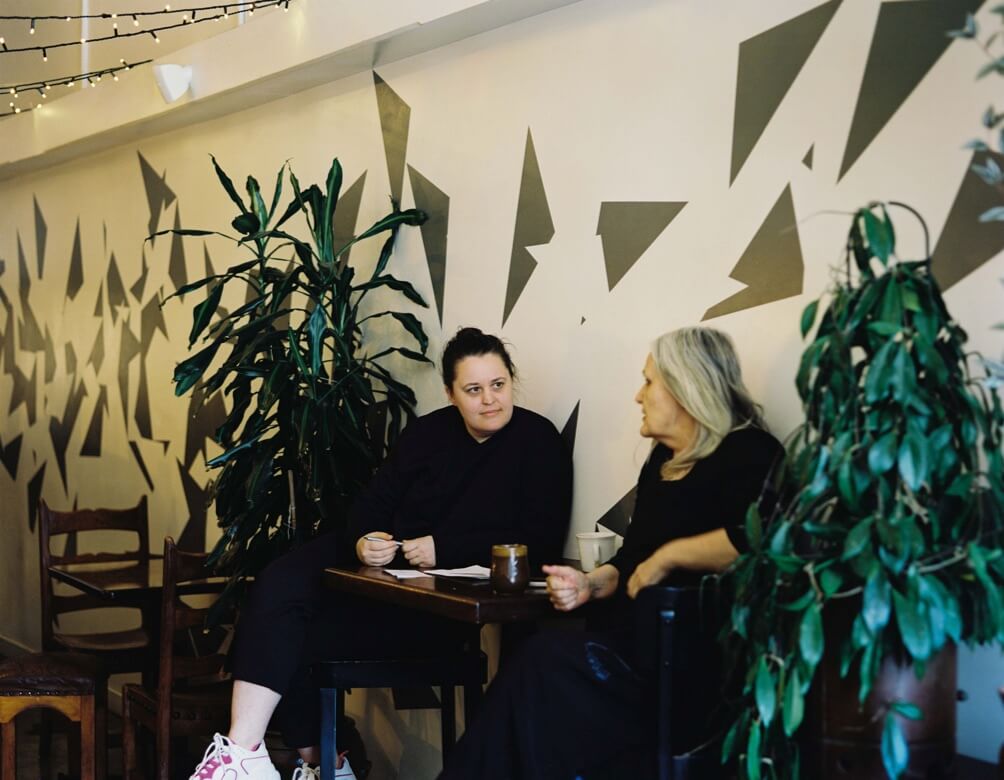
Lukrecya Craw and mother, Janita
A few months after our meal at Peach Pit, we catch wind that it is closing. I hear and feel the same plaintive sentiment echoing around me: but where will we go now? There is nothing else like it.
Karl and I have dreams of starting our own spot, so I head in to chat about the possibility of taking over the lease. As I enter, Lukrecya’s busy silhouette is perfectly framed amid the tableaux of the kitchen pass. Despite it being 11am there is an endless stream of visitors. The delivery guys, regulars popping in for some quick banter, a homeless person in need of the loo and a glass of water, her neighbour and longtime friend Angie, from the iconic Sri Pinang, who lingers to play with my baby as we chat. It dawns on me that this community is much bigger than the night trade. These are now decade-long relationships. I see a softer side, a gentler tempo: Peach Pit in the daylight.
On my way out, we take an impromptu tour of the Pit’s accumulated artefacts. There is a fluorescent urn, bursting with bananas and balls — a decoration by Judy Darragh for Ronnie van Hout’s 50th birthday party — and a large collection of iridescent dolphin ornaments (Lukrecya hates dolphins) gifted by Peach Pit’s most reliable supporter and silent partner, Lukrecya’s mother, Janita.
But perhaps the most poignant objects are the less obvious, like the height chart pencilled on to the kitchen door measuring those who literally grew up in Peach Pit. Or the salon-style hang of family photographs — which on closer inspection is a sentimental timeline of Peach Pit and record of all those it has homed. We don’t take the lease — it’s too big for our lives to handle — and we also can’t help but marvel what mighty big shoes those would be to fill.
Lukrecya has been at Peach Pit for a quarter of her life. She is the owner-operator, administrator, manager, chef and dishie who has made Peach Pit an institution. And she’s created this legacy on her own — which is, by anyone’s standards, nothing short of remarkable. Yet when I list these accolades back to her, she simply says, “It’s not mine. Peach Pit belongs to the community, the customers and the staff.” I pry into what the trade-offs have been — surely a feat of this nature cannot happen without mistakes and regrets. Without hesitating, she replies, “You only regret the things you don’t do.”
I look for sadness in her. Surely she will mourn it like the rest of us? But as we talk about The End, I realise that the opposite is true. Peach Pit is ending on a high. Lukrecya is done, and it’s simply time to move on. Sitting on the stool where I found my baby’s father, I ask her, “So what now?”
Lukrecya laughs, and with a shrug that says it all, replies, “I’m looking for a job.”
–

